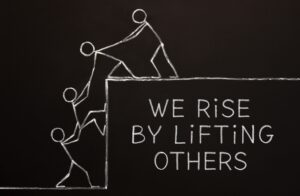Recovering from addiction is a journey filled with challenges, but for many, the journey doesn’t end with their own sobriety. Instead, it becomes a stepping stone to helping others find their own path to recovery. Peer support after addiction treatment plays a vital role in this process, offering individuals the opportunity to give back, make a difference, and save lives. In this blog post, we will explore the rewarding nature of helping others get sober after going through addiction treatment, highlighting the importance of peer support and the opportunity to obtain peer support training certification to continue making a positive impact.
The Rewarding Journey of Helping Others Get Sober:
For individuals who have successfully navigated their own recovery journey, the desire to help others find their way to sobriety often becomes a driving force in their lives.
- Personal Growth and Fulfillment:
- Helping others get sober provides a sense of purpose and fulfillment that can be deeply rewarding on a personal level.
- It allows individuals to use their own experiences and insights to make a positive difference in the lives of others, contributing to their own growth and healing in the process.
- Sense of Connection and Belonging:
- Peer support fosters a sense of connection and belonging within the recovery community, as individuals come together to support and uplift one another.
- By offering support and encouragement to others in recovery, individuals strengthen their own bonds with their peers and feel a deeper sense of belonging within the recovery community.
- Impact on Others:
- Helping others get sober has a profound impact on the lives of those individuals, providing them with hope, inspiration, and guidance as they navigate their own recovery journey.
- By sharing their experiences and offering support, individuals can make a tangible difference in the lives of others, helping them overcome obstacles and achieve lasting sobriety.
The Importance of Peer Support After Addiction Treatment:
Peer support is a cornerstone of the recovery process, offering individuals the opportunity to connect with others who have shared similar experiences and understand the challenges they face.
- Understanding and Empathy:
- Peers who have gone through addiction treatment themselves can offer a level of understanding and empathy that is unmatched by other forms of support.
- They can relate to the struggles, fears, and triumphs of those in early recovery, providing a source of comfort and encouragement during difficult times.
- Non-judgmental Support:
- Peer support provides a safe and supportive environment for individuals to share their thoughts, feelings, and experiences without fear of judgment or stigma.
- Peers offer unconditional acceptance and support, helping individuals feel heard, valued, and understood as they navigate their recovery journey.
- Role Modeling:
- Peers who have successfully maintained their sobriety serve as role models and sources of inspiration for others in early recovery.
- Their stories of resilience, perseverance, and transformation offer hope and encouragement to those who may be struggling with their own addiction.
The Opportunity for Peer Support Training Certification:
Obtaining peer support training certification provides individuals with the knowledge, skills, and credentials needed to effectively support others in their recovery journey.
- Professional Development:
- Peer support training certification offers individuals the opportunity to enhance their knowledge and skills in supporting others in addiction recovery.
- Certification programs cover a range of topics, including active listening, communication skills, crisis intervention, ethical guidelines, and self-care practices.
- Increased Effectiveness:
- Certified peer support specialists are better equipped to provide effective support to individuals in recovery, thanks to their specialized training and expertise.
- They can establish rapport, provide emotional support, and empower individuals to take an active role in their recovery journey, leading to positive outcomes and reduced risk of relapse.
- Career Opportunities:
- Peer support training certification opens up opportunities for individuals to pursue careers in the field of addiction treatment and recovery support.
- Certified peers may work in various settings, including addiction treatment centers, recovery residences, community organizations, and healthcare facilities, helping to make a meaningful impact in the lives of others.
Conclusion:

Helping others get sober after going through addiction treatment is a rewarding and fulfilling journey that allows individuals to make a positive impact and save lives. Peer support plays a crucial role in this process, offering understanding, empathy, and encouragement to those in early recovery. By obtaining peer support training certification, individuals can enhance their ability to provide effective support and make a meaningful difference in the lives of others. Together, we can empower sobriety, foster connection, and create a brighter future for individuals and communities affected by addiction.

